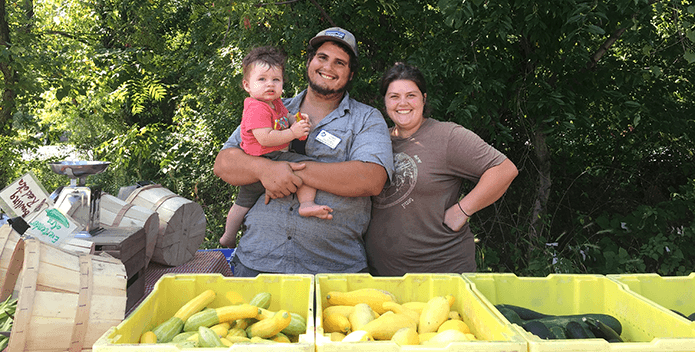Kneeling in a field of lettuce at 9:00 AM, a phone rings. Jared Planz, the Assistant Vegetable Production Farmer at Clagett Farm in Upper Marlboro, Maryland, pulls out his cell phone. It’s a call from someone who wants to volunteer, like I’m doing today. Jared is enthusiastic and welcoming. “Clueless and hardworking?” he says, “That’s perfect.” He quickly returns to cutting lettuce with several volunteers and full-time farm workers. “This is my office!” Jared says, who has worked at Clagett Farm for four years and lives there with his wife, Elissa, who is a Vegetable Grower, and their 11-month old baby.
I volunteered on a Wednesday, the day when people come to pick up their Community Supported Agriculture (CSA) shares in the afternoon. It’s a system where you sign up to receive in-season produce every week. Clagett farm holds three pickups in the region—one at the farm, one in Washington, D.C., and one at CBF headquarters in Annapolis, MD. Clagett Farm also donates 40% of their produce to the Capital Area Food Bank to provide free and reduced-price fresh produce to people living in poverty and near-poverty in Washington, D.C. Their tables are lined with greens, melon, corn, potatoes, tomatoes and more.
I sat down with Jared at CBF’s Annapolis office to learn more. “Coming to get your share today?” Jared said to a woman walking by, who was excited about the okra. Another staff member said in passing, “Best tomatoes I’ve ever had! We were fighting over them!” Jared explains, “We [CBF] can discuss better farming actions from a position of understanding—we’re not just talking about farming, we’re farming.” Clagett farm implements sustainable practices such cover crops, an alternative to adding tons of fertilizer and herbicides. The farm uses partial tilling and plants trees along its edges to intercept and filter runoff.
Clagett Farm is part of what makes the Chesapeake Bay Foundation unique. Farms may seem distant from the Bay’s waters, but they are closely connected—agriculture is the number one source of pollution in the Bay. Nitrogen and phosphorus runoff from farms filters into waters, altering their natural nutrient levels. This can lead to algal blooms, which limit oxygen and block sunlight, making it difficult for marine life to survive. That’s why CBF sponsors farms to implement sustainable practices, like planting trees, which will ensure healthy soil, water, and air in the long run.
At the end of my day on Clagett Farm, I left with a bag of vegetables, a bundle of flowers, and sore muscles. The farm is always happy to have volunteers, not just to dig up potatoes. As Jared says, once you come to the farm, it’s contagious. You leave ready to spread the word about why small, sustainable farms matter—to the Bay and to local communities. So, talk to a famer, ask questions, or give Clagett Farm a ring. Or give me a ring. I’m still working through the potatoes I brought home.



